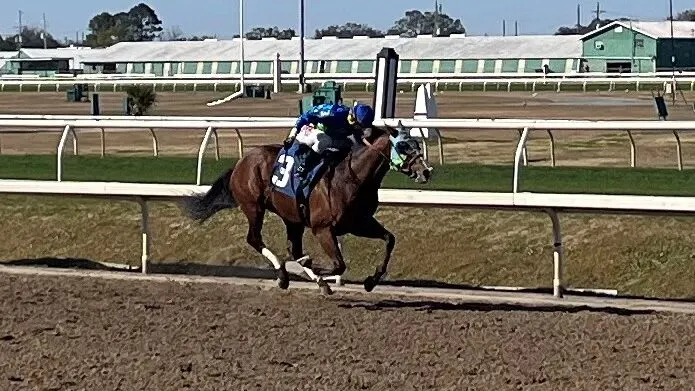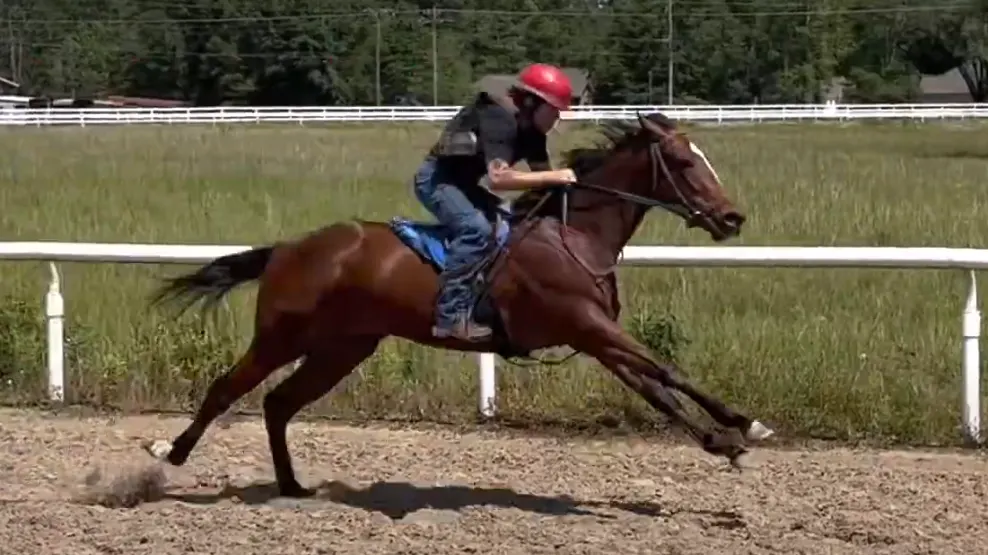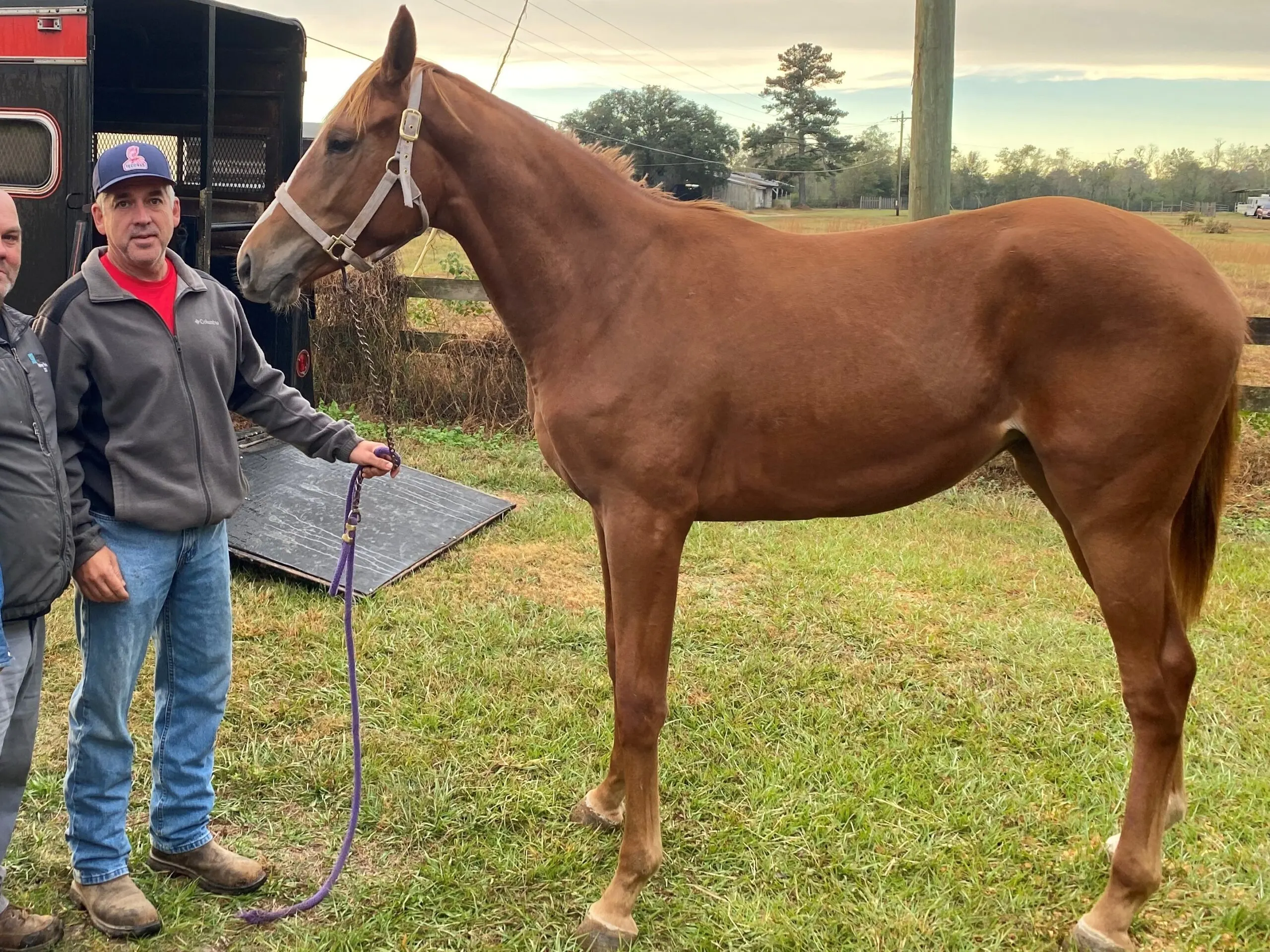Last updated: March 4, 2024
Have you ever wondered if a jockey can truly make a racehorse run faster? As a longtime racehorse owner, I’ve seen firsthand the profound impact a skilled jockey can have on a horse’s performance. It’s not just about speed; it’s about how a jockey’s expertise and strategy can unlock a horse’s full potential.
This article explores the dynamic partnership between horse and rider, delving into the art and science behind maximizing a racehorse’s speed. Join me as we uncover the truth behind the question: Do jockeys make horses run faster?

The Impact of Jockey Technique on Horse Speed
A groundbreaking study from London has shed light on the significant role jockey techniques play in enhancing horse speed. Here’s how:
Key Findings from the Study:
- The research revealed that the way a jockey rides, particularly their posture and movements, can indeed make horses run faster.
- Techniques that align the jockey’s movements with the horse’s natural rhythm, such as the “monkey crouch,” are shown to improve race performance.
The “Monkey Crouch” Technique:
- Originating in late 19th-century America, the “monkey crouch” involves jockeys bending their knees and using raised stirrups, minimizing air resistance and improving aerodynamics.
- This position allows jockeys to exert a vertical force that complements the horse’s motion, rather than working against it.
How Techniques Affect Performance:
- By reducing the energy the horse spends on moving the rider, these techniques allow the horse to focus its strength on speed and endurance.
- The study suggests that a well-executed jockey technique can lead to significant improvements in race times, making the difference between winning and losing.
The London-based study highlights the critical influence of jockey technique on horse speed. Techniques like the “monkey crouch” not only showcase the skill and strategy involved in horse racing but also underscore the importance of the jockey-horse partnership in achieving peak performance.

Jockey-Horse Synergy: The Heart of Racing Success
The bond between a jockey and their horse transcends mere partnership; it’s a profound synergy where mutual understanding and seamless communication converge to create racing magic. This synergy is pivotal, influencing race outcomes more than any other factor.
Understanding and Communication:
- At the core of this synergy is an intuitive understanding between horse and rider. A jockey must be attuned to the horse’s mood, physical condition, and even subtle cues that signal readiness or discomfort.
- Communication is not verbal but through the language of touch, pressure, and body movement. A slight shift in weight or a gentle nudge can convey complex instructions to the horse.
Examples of Synergy in Action:
- The Comeback Win: Consider the story of a racehorse lagging behind the pack, its chances seemingly dim. Yet, sensing a shift in the horse’s energy, the jockey adjusts their posture and offers encouragement through a subtle change in the reins’ tension. The horse responds, finding a burst of speed no one anticipated, clinching victory in the final seconds.
- The Rookie’s First Race: A young horse, inexperienced and jittery, stands at the starting gate. The jockey, recognizing the horse’s nervousness, maintains a calm demeanor, offering reassuring pats and speaking softly. This calmness transfers to the horse, helping it focus and run a surprisingly steady race.
The Impact on Race Outcomes:
- Races are not won solely on speed or strength but on the harmony between jockey and horse. A horse might possess unparalleled speed, but without a jockey who can harness that power effectively, potential remains untapped.
- The best jockeys are those who can ‘read’ their horses, understanding when to push forward and when to hold back, making strategic decisions that align with the horse’s capabilities and condition on race day.
The synergy between jockey and horse is a delicate dance of trust, understanding, and communication. It’s what makes horse racing not just a sport but an art. This connection can turn an underdog into a champion and a tense race

The Psychological Aspect
The mental and emotional state of a horse is crucial for optimal performance, and a jockey’s presence, demeanor, and actions significantly influence this aspect.
Building Confidence:
- Horses, like humans, sense and react to emotions. A confident jockey instills a sense of security and assurance in their horse. This confidence is contagious, helping to calm nervous horses and boost their self-assurance before and during the race.
- An example of this is seen when a jockey, through steady and assured handling, guides a jittery horse to the starting gate, transmitting a sense of calm and readiness that prepares the horse for the race ahead.
Motivation and Encouragement:
- Motivation from a jockey comes in various forms, from gentle coaxing to firm, assertive guidance. The key is knowing what approach works best for each horse. Some horses respond to soft, encouraging words or pats, while others may need a more energetic urging to perform their best.
- A notable instance of motivation in action is when a horse, flagging in the final stretch, finds renewed vigor through the jockey’s strategic encouragement, pushing past fatigue to reach the finish line.
Influencing Willingness to Perform:
- The willingness of a horse to perform can be significantly affected by the jockey’s actions. Positive reinforcement, such as praise after a good performance, reinforces desired behaviors, making the horse more eager to replicate those actions in future races.
- Conversely, a jockey’s frustration or impatience can create anxiety in the horse, potentially hindering performance. It’s a delicate balance where the jockey’s ability to maintain composure and positivity can make all the difference.
The Role of Trust:
- At the heart of the psychological impact is the trust between horse and jockey. A horse must trust that the jockey will guide them safely through the race, making decisions in their best interest. This trust is built over time through consistent, positive interactions that deepen their bond.
- Trust is evident when a horse, despite uncertainty or fear, follows the jockey’s lead, overcoming obstacles or challenges on the course.

Training and Preparation: The Foundation of Racing Success
The path to victory in horse racing is paved with rigorous training and meticulous preparation for both jockeys and horses. This preparation is multifaceted, encompassing physical conditioning, diet, mental readiness, and the development of a deep, intuitive partnership between horse and rider.
For Horses:
- Customized Training Regimes: Each horse undergoes a tailored training program designed to enhance its natural abilities, improve stamina, and refine racing techniques. Trainers assess a horse’s physical condition, temperament, and potential to develop a regimen that includes sprinting, endurance runs, and skill drills.
- Morning Workouts: Essential for building fitness, these sessions also acclimate horses to the racetrack environment. Trainers and jockeys monitor the horse’s response to various conditions, adjusting training strategies based on performance and behavior.
- Nutrition and Care: A horse’s diet is carefully managed to ensure optimal health and energy levels. Nutritional plans are complemented by regular health checks, grooming, and downtime for recovery and relaxation.
For Jockeys:
- Physical Fitness: Jockeys maintain a high level of physical fitness through a combination of cardiovascular training, strength conditioning, and flexibility exercises. This fitness regime helps them manage the physical demands of racing and control powerful racehorses at high speeds.
- Weight Management: Jockeys follow strict diets to meet weight requirements for races. This often involves precise calorie management and hydration strategies to achieve the desired weight without sacrificing strength or stamina.
- Mental Preparation: Mental toughness and sharp decision-making are critical in racing. Jockeys use visualization techniques, review race footage, and strategize with trainers to mentally prepare for races. This preparation helps them anticipate and react swiftly to the dynamic conditions of a race.
The Role of Morning Workouts for Jockeys:
- Beyond physical conditioning, morning workouts are a crucial time for jockeys to bond with their mounts. These sessions allow jockeys to understand a horse’s quirks, preferences, and signals, fostering a sense of trust and cooperation essential for race day.
The Impact of Preparation on Performance:
- The comprehensive training and preparation of both horse and jockey are instrumental in achieving racing success. For horses, it builds the physical and mental resilience needed to compete at peak levels. For jockeys, it ensures they are physically fit, mentally prepared, and deeply connected with their horses, enabling them to make split-second decisions that can lead to victory.

FAQs for “How Do Jockeys Make Horses Run Faster?”
What is the ‘Monkey Crouch’ in horse racing?
The ‘Monkey Crouch’ is a revolutionary riding style where jockeys adopt a crouched posture, minimizing air resistance and enhancing speed. It was popularized in the late 19th century and significantly improved racing times.
How has jockeying evolved over the years?
Jockeying has evolved with advancements in riding techniques, fitness regimes, and strategic insights, all contributing to more efficient and faster horse racing.
Are physical fitness and weight important for jockeys?
Yes, jockeys must maintain a balance of physical strength and lightweight agility to effectively control the horse and optimize its speed without burdening it.
Conclusion
The intricate ballet between jockey and horse in the high-stakes world of horse racing is a testament to the profound impact of human skill and animal prowess combined. Throughout this exploration, we’ve delved into the multifaceted relationship that exists between a jockey’s actions and a horse’s speed, uncovering the layers of technique, psychological influence, and rigorous preparation that contribute to racing success.
Key Insights:
- Technique Matters: The study from London provided a scientific basis for understanding how jockey techniques, particularly the “monkey crouch,” significantly enhance a horse’s performance by aligning with its natural movements.
- Psychological Impact: Beyond physical guidance, a jockey’s ability to instill confidence, motivation, and encouragement in their horse plays a critical role in how well the horse performs, underscoring the importance of their emotional and psychological bond.
- Preparation is Key: The detailed training regimes for jockeys and horses highlight the dedication to excellence required in this sport. Morning workouts, diet, and mental strategies are all part of the comprehensive approach to race readiness.
A Personal Perspective:
From my own experience as a racehorse owner, I’ve witnessed the transformative effect a skilled jockey can have on a horse. It’s not merely about the physical act of riding but about understanding and connecting with the horse, guiding it to unlock its full potential. The best jockeys become one with their mounts, moving in perfect harmony towards the shared goal of victory.
Further Reading and Resources
For those keen to explore this fascinating topic further, the following resources offer deeper insights into the science, art, and heart of horse racing:
- The Science of Jockey Technique and Horse Speed
- Understanding Horse and Jockey Synergy
- The Psychological Bond Between Horse and Jockey
Poll Question
Related articles:
Meet Miles Henry
An avid equestrian and seasoned racehorse owner, Miles Henry brings his extensive experience to the equine world, proudly associating with the AQHA, The Jockey Club, and various other equine organizations. Beyond the racetrack, Miles is an accomplished author, having published various books about horses, and is a recognized authority in the field, with his work cited in multiple publications.
🔗 Connect with Miles:
Twitter
Facebook
YouTube: Check out race highlights, horse care tips, and more!

